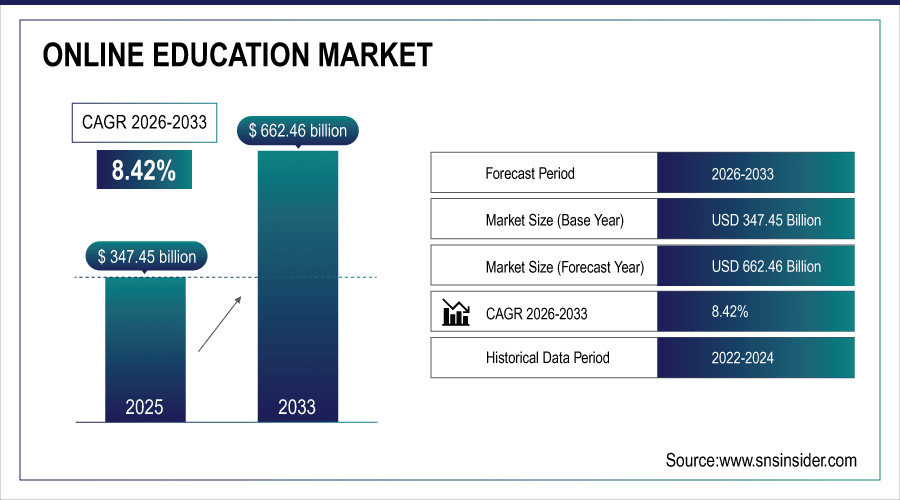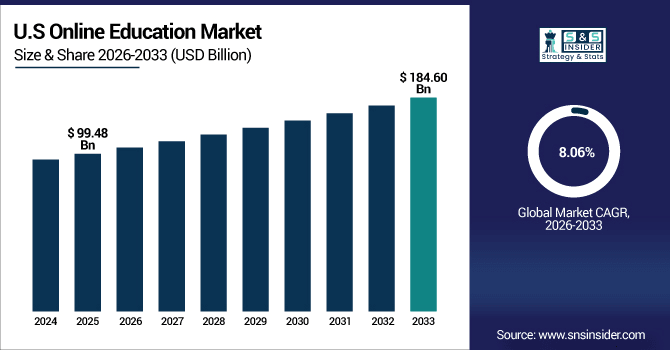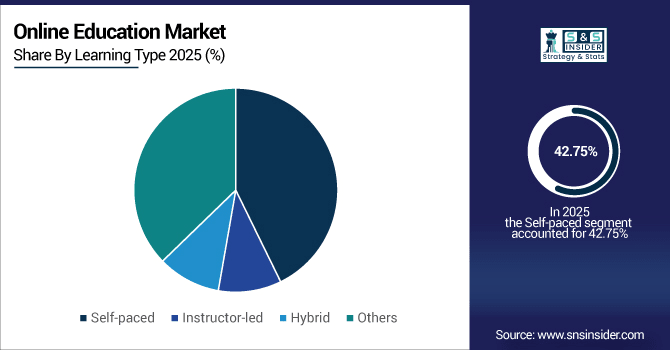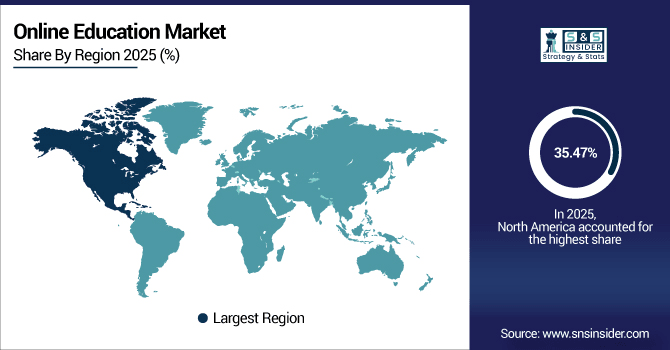Online Education Market Report Scope & Overview:
The Online Education Market Size was valued at USD 347.45 Billion in 2025E and is projected to reach USD 662.46 Billion by 2033, growing at a CAGR of 8.42% during the forecast period 2026–2033.
The market analyses self-paced, instructor-led, and hybrid training modes, while also analyzing mobile (eLearning) access to training content for learners. Key applications are K-12 education, higher education, corporate training, and skill development. The major players are students, working professionals, enterprises and Government. The market will grow slowly through 2033 on adoption of digital formats, flexible learning demand, upskilling requirements in businesses and advances in AI enabled educational platforms.
Self-paced learning accounted for 42% of the Online Education market in 2025, supported by rising demand for flexible and affordable courses among students and working professionals.

To Get More Information On Online Education Market - Request Free Sample Report
Market Size and Forecast:
-
Market Size in 2025: USD 347.45 Billion
-
Market Size by 2033: USD 662.46 Billion
-
CAGR: 8.42% from 2026 to 2033
-
Base Year: 2025
-
Forecast Period: 2026–2033
-
Historical Data: 2022–2024
Online Education Market Trends:
-
K-12 education contributed 27% toward the overall market share in 2025 on account of swift digital platforms incorporation in schools along with rising e-learning curricula acceptance.
-
Higher education added 24 percent with universities launching online degrees programs and foreign students signing up virtually.
-
Skill Upgradation courses accounted for 18%, indicating high demand for professional certifications and short-term job-oriented programmes.
-
Virtual Classrooms stood at 20% market share, driven by interactive tools, live lectures and collaborative learning.
-
31% of delivery was web-based, highlighting the continued markets as browser-deliverable is still the number one medium for both academic and corporate.
U.S. Online Education Market Insights:
The U.S. Online Education Market reached USD 99.48 Billion in 2025E and is projected to hit USD 184.60 Billion by 2033, growing at a CAGR of 8.06%. Growth is fueled by the rise in digital adoption, AI-powered learning platforms, corporate upskilling, mobile learning and government initiatives backing online and flexible education.

Online Education Market Growth Drivers:
-
Increasing Adoption of Digital Platforms and AI-Enabled Tools Drives Online Education Market Expansion Globally.
Online education market is increasingly gaining traction as the adoption of digital platforms and AI-based tools that provides personalization, engagement and accessibility in learning. By 2025, more than 1.8 billion learners around the world will use online courses in K-12, higher education, corporate learning and other skill-building situations. Of AI, virtual classrooms and mobile learning: With new solutions, flexibility, efficiency and interactivity are released in the global market.
Growing demand for flexible and technology-enabled learning drove 35% of online course enrollments in 2025, reflecting increasing learner preference for accessible, personalized, and interactive education solutions.
Online Education Market Restraints:
-
Limited Internet Access and High Infrastructure Costs Hinder Adoption, Restricting Growth of the Online Education Market Globally.
The online education industry is limited by weak Internet penetration and high cost of infrastructure. In 2025, one in five students in developing regions had unreliable internet access, while more than one in every seven schools cited the lack of digital resources as a challenge to accessing online platforms. These barriers are an impediment to scale, restrict the potential for enrollment and disincentivize investment in automation tools with artificial intelligence and virtual classrooms.
Online Education Market Opportunities:
-
Expanding Corporate Training Programs and AI-Enabled Learning Solutions Offer Significant Growth Opportunities in the Online Education Market Globally.
The rising trend in corporate training programs and the upsurge of AI enabled learning are some factors fueling growth of online education market. As of 2025, there were over 0.65 billion participants in Corporates and Profession Development courses, and learners could access AI empowered platforms to gain more than 0.23 billion enrollments. Handy & on-line application garnered 0.48 billion users owing to increasing unharness of the digital technology. These prospects are anticipated to increase as the companies’ value upskilling and tech-enabled customized learning expands globally across 2033.
Rising adoption of AI-enabled learning and corporate training programs accounted for 15% of total online course enrollments in 2025, reflecting growing demand for personalized, flexible, and skill-focused education solutions.
Online Education Market Segmentation Analysis:
-
By Learning Type, Self-paced held the largest market share of 42.75% in 2025, while Hybrid is expected to grow at the fastest CAGR of 9.68%.
-
By Technology, Learning Management Systems (LMS) contributed the highest market share of 28.43% in 2025, while AI-enabled Platforms are forecasted to expand at the fastest CAGR of 11.32%.
-
By Application, K-12 Education held the largest share of 27.54% in 2025, while Skill Development is anticipated to grow at the fastest CAGR of 10.87%.
-
By End User, Students accounted for the dominant share of 38.62% in 2025, while Enterprises are projected to grow at the fastest CAGR of 10.45%.
-
By Delivery Mode, Web-based solutions held the largest market share of 31.27% in 2025, while App-based delivery is expected to expand at the fastest CAGR of 9.95%.
By Learning Type, Self-Paced Retains Market Leadership, Hybrid Gains Popularity:
In 2025, more than 0.76 billion learners choose online self-paced courses due to the advantage of flexible time and customized learning. Hybrid courses, which mixed online components with real-world classes, had 320 million enrollees and took hold as people looked for organized instruction that still offered flexibility. Hybrid structures will give access to an exciting expansion of 0.65 billion learners by 2033, mainly attributed to corporate training and skill development courses coupled with the increasing reliance on AI-driven learning platforms worldwide.

By Technology, LMS Leads Adoption, AI-Enabled Platforms Expand Rapidly:
Learning Management Systems (LMS) benefitted 0.54 billion users in 2025 and were widely adopted in universities and enterprises for course management and progress tracing. 0.18 billion users accessed platforms with AI features, featuring personalized content recommendations and intelligent testing and adaptive assessments. By 2033, AI powered solutions are expected to cater to 0.55 billion learners driven by new-age learning tools and smart classrooms' emerging in both educational institutions and enterprises.
By Application, K-12 Dominates, Skill Development Sees Fast Growth:
There were 0.62 billion K-12 students enrolled worldwide in 2025 who benefited from digital curriculum implementation and online classes. Courses on skill development reached 0.27 billion learners, a foretaste of the demand for professional and short-term job-oriented certifications. Skill development enrollments are forecasted to expand to 0.58 billion by 2033, primarily attributed to corporate upskilling, online vocational courses and government initiatives aimed at enhancing workforce readiness in developing economies.
By End User, Students Drive Market, Enterprises Show Rapid Uptake:
In 2025 students will take 0.81 billion online courses including university and school as well as professional development programmes. Online training by businesses trained 0.29 billion employees for upskilling, reskilling and digital transformation projects. The enterprise with AI-based corporate learning platforms, remote workforce training, increased focus on lifelong professional development on the rise globally is expected to make up over half billion in adoption by year 2033.
By Delivery Mode, Web-Based Remains Popular, App-Based Accelerates Growth:
The Web-based learning was expected to serve 0.68 billion users in 2025, providing a new platform for the academic and corporate learners that enables access of courses using browsers. On-demand delivery via apps acquired 0.35bn users, its growth led by convenience of mobile learning, microlearning chunks and interactivity. App-based learners are expected to rise to 0.71 billion by 2033 supported by smartphone adoption, gamification, AI-powered tutoring and the increasing desire for flexible/anywhere learning on a global scale.
Online Education Market Regional Analysis:
North America Online Education Market Insights:
In 2025, North America accounted for 35.47% of the online education market, with 620 million learners. K-12 education enrolled 210 million students, higher education 180 million and corporate training had 120 million learners. Web-based distribution had appeared to over 110 million users, which also highlighted robust digital infrastructure and internet connections. The market is projected to expand through 2033 with growing acceptance of AI-based learning technologies, mobile platforms and corporate upskilling initiatives by the government promoting digital education.

Get Customized Report as Per Your Business Requirement - Enquiry Now
U.S. Online Education Market Insights:
The US online education market for 2025 had more than 420 million users, with 150 million in K-12, 130 million in higher ed and 90 million corporate training. Online reached 120 million users, apps-based learning hit 80m driven by the uptake of mobile and AI tools as well as digital access.
Asia-Pacific Online Education Market Insights:
The Asia-Pacific online education market, the fastest-growing region, is projected to expand at a CAGR of 10.26% through 2033. More than 680 million learners had taken part in 2025, with numerically the largest participation from China (240 million), India (180 million) and Japan (95 million). Web was the single largest platform, with 210 million users a testament to rapidly-growing digital penetration. Increasing need of skill development, K-12 digital learning, and AI-enabled education solutions will support robust regional business growth.
China Online Education Market Insights:
In 2025, China’s online education market was catered by more than 240 million learners, of whom 100 million were for K-12, 80 million for higher education and 40 million for corporate training. Internet platforms served 90 m users, and app-based learning 60 million, consolidating rapid market growth through to 2033 with digitalisation and AI solutions for education.
Europe Online Education Market Insights:
Under the Impact in 2025, Europe's online education market provided for more than 310 million learners, with Germany (95 million), UK (85 million) and France (70 million) being its most active players. K-12 programs serving 120 million and higher education another 100 million while corporate training programs served 60 million. The online platforms catered to 90 million users, while app-based learning was accessed by 55 million. Digital and AI-based learning and corporate upskilling programs will drive market expansion through 2033.
Germany Online Education Market Insights:
In 2025, the online education market of Germany catered into more than 95 million learners in which there are 40 million were enrolled in K-12, 35 million was enrolled at higher education and around 15 million population of corporate training. Web platforms catered 35 million users and app-based learning was offered to 25 million, with the upsurge in digital adoption and AI-driven education aiding growth till 2033.
Latin America Online Education Market Insights:
In 2025, the Latin American online education market included more than 95 million learners and was dominated by Brazil, Mexico and Argentina. K-12 programs served 40 million learners, higher education 30 million and corporate training 15 million. There were 35 million online users driving market growth by 2033, spurred on by rising digital learning adoption, mobile learning and AI-based educational solutions.
Middle East and Africa Online Education Market Insights:
As of 2025, the Middle East & Africa had 65 million online learners; including 28 million in K-12, 20 million in higher education and 12 million corporate. High growth in the region is accredited to rapid digitization, mobile learning, AI based platforms and government initiatives such as promotion of e-learning.
Online Education Market Competitive Landscape:
Coursera is a leading online education platform, partnering with 350+ top universities and organizations worldwide. By 2025, it counted 175 million registered learners taking courses, specializations, professional certificates and degrees. Consequently, Coursera is the dominant player in its domain for several reasons: academic validation, a broad range of content and programs geared toward education and enterprise to help organizations and individuals upskill faster. Its continuous product upgrade and global expansion underpin its leading stance in the fast-growing online education market.
-
In September 2025, Coursera launched Skill Tracks, guiding learners from foundational knowledge to expert proficiency in specific occupations, using data-driven insights from millions of learner interactions to map verified skill paths and accelerate career readiness.
Udemy is a global online learning platform with over 59 million students and 200,000+ courses as of 2025. Its backlist of titles covers professional development, technology and personal enrichment. Udemy is the most popular because it’s widely available and offers flexibility in the types of learning you can do, as well as reaching an international audience. Its capability to meet the requirements of various types of learners in conjunction with partnerships and scalable course offering, keep it competitive among others in the online education category.
-
In August 2025, Udemy introduced an AI-powered Role Play feature to enhance workplace communication, leadership, and problem-solving skills through interactive simulations replicating real business scenarios.
LinkedIn Learning leverages LinkedIn’s professional network to provide career-focused online courses to millions of learners worldwide. In 2025, the site now published tailored suggestions, industry certifications, and business training programs. Market strengths are its LinkedIn profile integration, data driven course recommendations and emphasis on employee’s and professional’s upskilling. Leveraging these capabilities for enterprise and consumers, will further cement LinkedIn Learning as a leader in the global online education ecosystem.
-
In November 2025, LinkedIn will integrate AI to provide personalized course recommendations based on member profiles, resumes, and activities, enabling tailored learning paths aligned with career goals while allowing users to opt out through privacy settings.
Online Education Market Key Players:
Some of the Online Education Market Companies are:
-
Coursera
-
Udemy
-
LinkedIn Learning
-
edX
-
Khan Academy
-
Duolingo
-
MasterClass
-
Skillshare
-
Teachable
-
Thinkific
-
Moodle
-
Blackboard
-
Udacity
-
Codecademy
-
Pluralsight
-
FutureLearn
-
Byju’s
-
Simplilearn
-
Age of Learning
-
Phoenix Education Partners
| Report Attributes | Details |
|---|---|
| Market Size in 2025 | USD 347.45 Billion |
| Market Size by 2033 | USD 662.46 Billion |
| CAGR | CAGR of 8.42% From 2026 to 2033 |
| Base Year | 2025 |
| Forecast Period | 2026-2033 |
| Historical Data | 2022-2024 |
| Report Scope & Coverage | Market Size, Segments Analysis, Competitive Landscape, Regional Analysis, DROC & SWOT Analysis, Forecast Outlook |
| Key Segments | • By Learning Type (Self-paced, Instructor-led, Hybrid, Others) • By Technology (Learning Management Systems, Mobile Learning, Virtual Classrooms, AI-enabled Platforms, Others) • By Application (K-12 Education, Higher Education, Corporate Training, Skill Development, Others) • By End User (Students, Professionals, Enterprises, Government, Others) • By Delivery Mode (Web-based, App-based, Offline/Downloaded Content, Others) |
| Regional Analysis/Coverage | North America (US, Canada), Europe (Germany, UK, France, Italy, Spain, Russia, Poland, Rest of Europe), Asia Pacific (China, India, Japan, South Korea, Australia, ASEAN Countries, Rest of Asia Pacific), Middle East & Africa (UAE, Saudi Arabia, Qatar, South Africa, Rest of Middle East & Africa), Latin America (Brazil, Argentina, Mexico, Colombia, Rest of Latin America). |
| Company Profiles | Coursera, Udemy, LinkedIn Learning, edX, Khan Academy, Duolingo, MasterClass, Skillshare, Teachable, Thinkific, Moodle, Blackboard, Udacity, Codecademy, Pluralsight, FutureLearn, Byju’s, Simplilearn, Age of Learning, Phoenix Education Partners |

